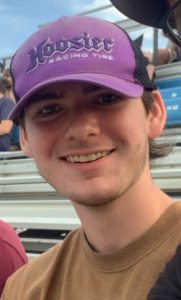Covid Regulations: Is Campus as Safe as We Think?
A Q&A with Sal Cintorino
October 14, 2021
As Corona Virus variants continue to develop, many wonder how safe in-person learning is. Central Connecticut State University’s Chief Operations Officer, Sal Cintorino, has answered many students’ pressing questions.
Cintorino, a CCSU alumnus himself, has worked at Central for over 30 years. He has done 40 interviews with “The Recorder,” at least half a dozen of which were related to COVID-19 this past year.
Cintorino hopes not only to provide information to students but also to raise awareness about how in-person learning could be made more efficient.
Q: Can you just briefly state what your role has been in coordinating in-person learning during COVID?
A: I serve as the Chief Operations Officer for the university, and I am also the COVID Coordinator for the CCSU. I represent the Central as the COVID Coordinator of higher education meetings. I go to the weekly and daily DPH [Department of Public Health] meetings at the state level and at the local level, as well as our CDC [Centers for Disease Control and Prevention] liaison. I have really been responsible for working in coordinating the entire blueprint. Our number one goal has been, if we can find a safe way to do it, it is something we should explore. The most important thing to us is to maintain the integrity of a safe environment that has an opportunity for everybody to learn and be successful.
Q: How often would you say that campus buildings, particularly classrooms, are being cleaned?
A: We have a full staff that cleans every single day. Before COVID, they were cleaned typically five days a week with minimal cleaning on the weekends—usually during first shift. Since COVID hit, they are cleaned seven days a week, 24/7 and we have three shifts. In most buildings, you will see there are still hand sanitizers. We have cleaning kits on each floor where people can pull out wipes to clean their desks if they so choose.
Q: How many people have not uploaded their COVID-19 vaccination records?
A: Right, so the percentages that we collect are based on who has uploaded their vaccination forms, so they need to go into Medicat [their] vaccine card. We collect data based on the submissions that are uploaded through Medicat. 95% of those submissions that we have are fully vaccinated, which is really great. And then for our commuter students right now, from everybody that’s uploaded. We’re at almost 90%. 80% is what they call herd immunity, which means that even with that other percentage not being in the mix [unvaccinated students], that it’s probably as good of environment as you could be looking for. Some people said, “Well, you know, maybe you should let the masks go.” And we were like—why? It’s another layer of protection, right? We are still working on people getting vaccinated, we still have these new variants that are coming out, you know. The CDC has explained the benefits of wearing a mask. So, again, we’re creating layers.
Q: Would it be safe to say that the number of people getting tested every week is the same number of people who are exempt?
A: This goes into how we work on compliance as well. The group we have the best—I do not mean it in a negative way—control over is our residential students. They have a personal relationship with their resident director to some degree.
We have a third party who does our testing. We get the results in [our] meetings every single morning. Part of that group is Dr. Tully, who is the Interim Vice President for Student Affairs, and then Jean Alicandro, who is our Director of Residence Life for the entire campus. When that information is coming, we [may] see that somebody has missed their test. Then we have this whole progressive compliance plan. The Residence Director goes to the student and says, “Listen, I received information that you missed your test. You need to make sure that you’re there next Monday morning to take that test for compliance.” Then that information goes to Dr. Tully. Round two: they get a letter from him [Tully] and then it goes to Stephanie Reis who oversees Student Rights and Responsibilities where there be serious progressive discipline.
Q: Are these notices automatically generated out? Who is in charge of tracing?
A: We actually have somebody dedicated to pulling the data every single day. That data gets in those morning meetings, so everybody in that meeting gets that information. Then it gets processed through there.
Q: How is it that you keep track of all the vaccination records? I know, you said that it is generated by the Vice President, but who is really in charge of contact tracing?
A: All the information goes right into Medicat, which goes into health services. That stays under the direction of Dr. Cheema, our university physician. But for the daily tracking and all the testing, we have a contact tracing team. We started that over a year ago, we had over 22 people that were trained in contact tracing. They are working every day, and are part of the contact tracing as it pertains to people testing positive [and] people that have been in contact. A chain of phone calls is made based on that. The data collecting itself is another group of people that are dedicated to extrapolating out who has been tested, who was positive, who was negative, how many people were tested, and how many people were not at the testing site that day. It is kind of like a behind the scenes thing, but there is a lot to it.
Q: So basically, what you are saying is that the number of people that are being tested every week, are not just people who are exempt, it is also people who may be in close contact?
A: Absolutely. Okay, so if you call in and you say, “I don’t feel good today,” there’s an app and the way it is set up, anytime you do not feel good—you fill out the symptom tracker. When you do that, you end up getting a Telehealth appointment. During that conversation, they might say, “Listen, we want you to come in, you’re going to be tested.” We test people based on Telehealth every single week. Four months ago, the CDC said once you are vaccinated, you do not need to be tested. Right? Everybody was like, “Okay.” Then about two months ago, they said, “Well hold on, even if you’re 100% vaccinated, if you are in contact with anybody that ends up being positive, you must be tested within three to five days.” So, we are testing anytime someone is positive, anybody that they have been in contact with, are being tested. We are pulling people in all the time.
In addition to that, we randomly pull student-athletes based on their National Collegiate Athletic Association requirements. Some of them are pulled in for biweekly and random selection of testing because they are traveling all over the place. Part of that group is pulled in too, so there is a lot of different people that go into the testing protocols and become part of that group.
Q: How is the university dealing with unvaccinated athletes? Has that been an issue?
A: Almost 100% of the athletes that are back [are vaccinated], I am saying almost because there are maybe one or two, that still, are not in season right now. But they are going to have to make a decision, because that is going to impact them.
Q: What is the protocol for isolation and quarantine for campus residents and how are students notified if they are in close contact and in need of quarantining?
A: If they are identified as being positive, they are immediately called by the contact tracing team. They are notified that their test results were positive and then a discussion takes place, because when you test positive, you go must be isolated. We have our two buildings on campus, right there that are fully set up: one for quarantine and one for isolation. They were old residence halls that we took offline. Then we basically set it up where they put their things together, we actually have them transported from their room to their isolation location. The check-in, their meals are supplied from there, we work with the student affairs to make sure if they have academic needs, we reach out to their parents, their professors, and they remain there until their Telehealth, their provider, or our campus physician releases [them].
Typically, in isolation, you are there for 10 days. But if you still had symptoms, it could be longer. Then for quarantine, two things could occur. One is if you become symptomatic, you could fill out the app and then get a Telehealth appointment–or you could have a close contact. If you are identified as a close contact, and you are vaccinated, typically within three to five days from the time you are the contact, the CDC requires you to be tested, if you are not vaccinated, you immediately go into quarantine, and that is for 14 days.
Q: Who is checking in on them during that period?
A: Believe it or not, we have hired a complete staff. We have a complete network in these buildings. We have nurses that are in there, so they have support around the clock. Like I said, their meals are even delivered. They have a full service in there. There are cleaning protocols in there and a special cleaning crew that goes in there as well. Both the quarantine and isolation building are fully set up to be managed the entire time.
Q: Are there any situations in which a student who is quarantined or in isolation would be sent home, even if they are a resident?
A: Some of the kids have said to us, “I want my mom and dad to be around, like, I want that food.” So we help them pack their stuff, and they will go home for 10 days. Again, they can not come back until they are clear through by our university physician. So certainly, there are students who do that. And the inverse of that, mind you, we have had commuters that said to us, “I do not want to stay in my apartment,” we take them from off-campus and bring them on campus. We have worked in both directions.
Q: What are the repercussions if someone fails to quarantine or isolate for the required amount of time?
A: You would be sent directly to the Vice President of Student Affairs, and that would be a progressive discipline that happens very quickly. We can not afford to have somebody that is supposed to be in quarantine or isolation just be walking around.
Q: Absolutely. I know for me, I was vaccinated really early because I am a first responder and I had just sort of forgotten to upload my stuff. I did it last week, but I was a little concerned. I was like, “That’s a little weird that no one’s been coming up to me or anything.” I was just wondering; do you think that maybe they need more support?
A: Yeah, I mean, it is a good point. As I said, here, I know with the residential, we are more hands-on. It is so much easier there. And with the commuters, that group is separated. So, you are right, I mean, it has not been 100% perfect. But I will assure you that the process is to move forward.
If you have questions regarding COVID-19 or on-campus protocols: go to the CCSU Blueprint at www.ccsu.edu/blueprint/index.html, or call the COVID Hotline at (860) 832-3200.





